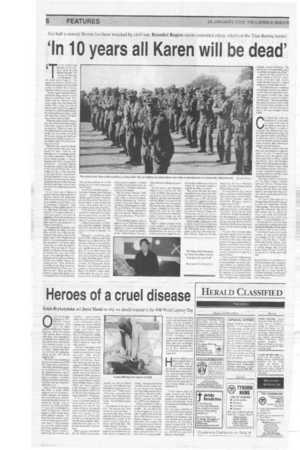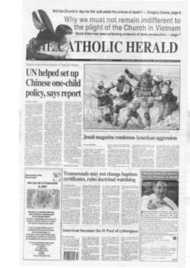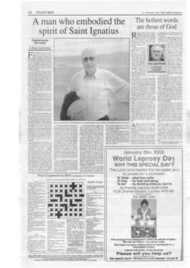Page 6, 24th January 2003
Page 6

Report an error
Noticed an error on this page?If you've noticed an error in this article please click here to report it.
Tags
Share
Related articles
Premier Oil Gets Tough As Battle Goes To War Over Burma
Sleeping In The Face Of Genocide
Burma Frees James Mawdsley
Mawdsley Broke His Own Nose, Says Burma's Ambassador
Burma Genocide Claims Contested
`In 10 years all Karen will be dead'
Tell the world to put pressure on the military regime to stop killing its people." the 15-year-old Shan boy said pleadingly. "Tell the world not to forget us." His appeal was heartfelt and his eyes betrayed his torment as he recounted seeing his father shot dead by Burmese soldiers in his rice paddy.
The boy waited until the military had left the village, and then took his father's corpse back home. Two weeks later the Burmese army struck again. this time killing his mother. The village was burned down and he himself was captured and taken as a porter for the military. He was forced to carry heavy loads and walk long distances for three days. with no food or water.
When he collapsed from exhaustion, the soldiers beat him savagely with sticks and guns until he fell unconscious. When he woke up, the soldiers had left and he made his escape. For two weeks he lived in the jungle, eating tree bark and banana pulp. Finally, he made it to the relative safety of a Shan resistance army base.
This boy's tale is typical of almost a million people who have been displaced since 1996 by the Burmese junta's campaign against the ethnic minorities. While the seven ethnic groups — Karen, Karenni, Shan, Mon. Arakan. Chin and Kachin — have been fighting for self-determination since the end of the Second World War. their struggle for survival has intensified in the past decade. Occasionally them are glimmers of hope, such as the release of the democracy leader Aung San Suu Kyi in May this year, but even such steps forward have not helped the plight of the ethnic groups.
A few years ago a Burmese general summed up the intentions of the junta when he said: "In ten years all Karen will be dead. If you want to see a Karen, you will have to go to a museum in Rangoon.That chilling warning applies equally to the other ethnic minorities, and is indicative of a regime desperate to cling on to power and crush all opposition. There are at least seven million Karen and seven million Shan. out of a total population in Burma of 40 million.
The regime has a systematic strategy of brutality. Its soldiers are under orders to loot. bum, kill and rape whenever they enter a village in the ethnic states. If the villagers are not killed or do not manage to escape, they are taken to relocation camps where they are under the regime's control. They are used for forced labour or as human minesweepers. In October this year, over 1,000 troops swept through Mong Nai, Klio Lam and Kengtong townships in Shan state. killing, beating and raping people. Their intention, according to the Shan resistance leader Colonel Yawd Serk, was "to clear the area". There are plans to construct a large hydro-electric plant at Kengtong Fall, and the Burmese will use forced labour for it. The project has investment from Japan and Thailand.
Five of the seven ethnic groups the Karen, Karenni, Shan. Mon and Arakan — are fighting an armed struggle against the junta That struggle. according to Col Yawd Serk, is based simply on three desires that "every human beinghas: to live in freedom, peace and prosperity.
"If the Burmese junta were fair and just we would never have taken up arms against them," he said. "We bear arms because we have no other choice. It is just for survival."
A Karen commander, a Christian, echoed that sentiment "We fight with love, not with hate. We fight simply to defend our people," he said.
Although it is not directly a religious conflict, religion is used by the Burmese as a weapon of war. The majority of Burmese are Buddhist, but among the Karen and Karenni are a significant number of Christians. The junta targets Karen and Karenni churches and pastors and has tried to divide the ethnic groups by pitting Buddhist against Christian. The Burmese army has created a militia, the Democratic Karen Buddhist Army (DKBA), under its control, to sow disunity among the Karen. The DKBA is under orders to burn down all churches, and to convert those churches it doesn't destroy into monasteries. A church in Koatko village in Karen state was turned into a Buddhist monastery last year, for example.
But the Karen Christians' faith is unbroken. One pastor whose entire village. including the church, had been destroyed said: "We have to leave village after village, house after house. but it increases our faith. We are Christians. We know God will help us.And he appealed for help from abroad: "Please remember us in your prayers. Please don't forget."
Pastor Timothy Laldem. a Karen pastor living in Thailand, struck a similar note addressing Karen soldiers at a base inside Burma. "We cannot rely on men, on nations, on the United Nations.he said. "But with God, all things are possible.
Yet the junta is only Buddhist when it suits it politically. The mainly Buddhist Shan people are persecuted, and in Karen state Buddhists who don't ally themselves with the DKBA are targets for the junta. A Burmese army commander, after lending many attacks on Karen villages, summed up the junta's philosophy when he said, after urinating on the head of a Buddhist monk: "I do not respect any religion. My religion is the trigger of my gun."
Rape is another weapon in the junta's artillery. A 30-year-old woman from southern Shan state described how she and two other women were gang raped for over half an hour on their way to town. It is part of a systematic strategy to degrade the ethnic minorities.
The current atrocities are being perpetrated by an illegitimate military regime which seized power in a military coup in 1962 and which has ruthlessly suppressed dissent since then. In 1990 it agreed to hold elections, but when the result was a massive victory for Aung San Suu Kyi and the National League for Democracy (NLD), the junta's response was to detain Suu Kyi and NLD leaders and ignore the result.
Human rights campaigners tend to focus on achieving democracy for Bunna. They seek recognition of the 1990 results and the transfer of power to Suu Kyi. But while freedom will go a long way towards improving the lot of Burma's people, it is not the ultimate solution for the ethnic groups.
If Aung San Suu Kyi came to power and treats us fairly and justly. then we can have a good relationship with the Burman," said Col Yawd Serk. -But peace cannot be gained automatically.
The ethnic groups seek equal rights and autonomy. which requires negotiation. Some. like the Shan and Karenni. demand independence but are prepared to accept autonomy in a federal Burma provided they get a fair deal. But first, said Col Yawd Serk, the Burmese army must prove that the ethnic groups can trust it.
"To prove they are trustworthy, they must withdraw from the ethnic states first. Then a referendum can be held and the states can come together with equal representation to design a constitution. Every ethnic state must have its own administration without interference from a central government. It must be a genuine union."
There is a palpable feeling among the ethnic minorities in Burma that the international community, especially Britain, has forgotten them. The Karen and the Shan, for example, were loyal British allies against the Japanese in the Second World War. "The Karen are hoping for the British to help us now." said a Karen Catholic student in Bangkok. 'The British have a responsibility and I would like to remind you of that."
General Bo Mya, leader of the Karen resistance, said the international community only "speaks words but takes no action" in regard to Burma's human rights record.
"The international community should help instead of just talking," he said. Pressure should be intensified against countries, like Japan and Thailand, which do business with the junta. 'They are supporting the regime to generate funds which will be used to buy weapons to kill more people. The more time that is taken, the more people will be killed."
Col Yawd Serk want.; the international community to recognise the claims of the ethnic groups and to push Burma to agree to tripartite talks between the junta, the NLD and the ethnic groups, He also urges the world to press Burma to allow free access to the ethnic states for foreign reporters. human rights monitors. drug enforcement agencies and aid agencies.
"We want the world to force the Burmese government to open the doors," he said. "If reporters and observers have the right to travel freely and observe freely, without interference. they will find three truths: who is abusing human dens, who are the victims of rapes caried out by Burmese troops for decades, and they will fmd the poppy fields, the drug traffickers and the culprits behind the drug business."
The finger of blame for drub in the so-called Golden Triangle between Burma, Thailand and China is often pointed at the ennic groups. But the Shan and Karen claim to have strict anti-drugs policies and accuse the junta of barring the drugs trade.
Col Yawd Serk appealed to foreign drug enforcement ageruies to come and spend time with the ethnic groups. "We invite then as long-term observers. But if hey don't accept, then we ask then to invite us to come and testify. We will testify in every court in the world — except a Burmese cart.
For the past 53 years the Keen and other ethnic groups have teen fighting the Burmans. There appars no end in sight to the confict. "Every Karen wants to live in heir country. As long as we don'tget our country, we will continually fight," said Bo Mya. "Andwe believe that God is with us. 11a is
our motivation. The Burmese lave to borrow money, they are it all kinds of debt. We have no deblyet we still survive. In the end we ;ill win.
Benedict Rogers is a freelance jurnalist and human right; campaip: He has recently retuned fromllis fourth visit to the Thai-Buena border. He is a boon! ?nem& of Christian Solidarity 4119rldwidend a Trustee ofthe Metta Trust for 61dren's Education.
blog comments powered by Disqus















